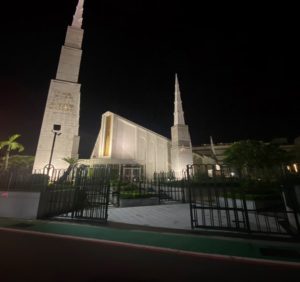Visit of the headquarters of a minority religion in Taiwan, Jehovah’s Witnesses (Credit: HRWF)
TAIWAN: No anti-cult activity, no religious intolerance: the example of Taiwan
Are European states in a position to teach lessons to other countries about religious inclusion and religious tolerance? Taiwan might be.
By Willy Fautré, Human Rights Without Frontiers
HRWF (21.08.2023) – Taiwan is home to a wide range of religious or belief communities, either theistic or non-theistic, and no societal or state intolerance is reported in this country, including towards so-called new religious movements, while this is not the case in Europe. Why?
During two trips to Taiwan this year, I took a close look at this culture of tolerance and inclusiveness and I wondered why in Europe a number of states with a dominant Christian religion in their history had developed a culture of intolerance, suspicion and stigmatization about new religious movements. Some short reflections on this issue.
Religious intolerance in Europe
One of the factors fueling religious intolerance on the European continent is the activity of former members of non-traditional religious or belief communities who have left them in the midst of a conflict and who are driven by a spirit of revenge. Groups of apostates have thus formed out of common hostility to various movements, which they have designated as dangerous and harmful cults, such as Jehovah’s Witnesses, Hare Krishna, Mormons, the Unification Church, Scientology and others.
The dynamics of the apostates’ groups in Europe especially developed at the time of massacres and collective suicides perpetrated within some marginal religious groups in the 1990s on the American and European continents. They found allies in the media, who were looking for “juicy” stories, and they quite often fed them with unfounded accusations, distorted information and fabricated cases, creating hereby a climate of social anxiety and hostility. The word “cult”, systematically attributed to new religious or belief movements, became a signal of distrust, threat and danger. Many European governments surfed on this media wave of stigmatization, demonization and hostility. Intolerance and discrimination followed and continue to this day, in particular through their so-called “cult observatories” in some countries.
This climate of intolerance was clearly denounced by USCIRF (United States Commission on International Religious Freedom) in its recent report (24 July 2023) titled “Religious Freedom Concerns about Religious Freedom in the European Union” in which a section was devoted to the anti-cult issue and was stressing that “Several governments in the EU have supported or facilitated the propagation of harmful information about certain religious groups.”
The context of Taiwan’s religious tolerance
Taiwan does not a have dominant religion, unlike most European countries, as a survey by the Academia Sinica’s Institute of Sociology released in 2021 shows.
27.9 percent of the population exclusively practices traditional folk religions, 19.8 percent Buddhism, and 18.7 percent Taoism, with 23.9 percent identifying as nonbelievers. The rest of the population consists mainly of Protestants (5.5 percent), I-Kuan Tao (2.2 percent), Catholics (1.4 percent).
Members of other religious groups include Jews, Sunni Muslims, the Baha’i Faith, Jehovah’s Witnesses, Mahikari, The Church of Jesus Christ of Latter-day Saints, the Church of Scientology and the Unification Church.
Some studies find that as many as 80 percent of religious practitioners combine multiple faith traditions. The concept of heresy or normative religious orthodoxy is therefore not prevalent.
As of the end of 2019, there were more than 15,000 registered religious groups representing over 20 religions.
Jehovah’s Witnesses, Mormons or Scientologists, just to name a few, are “unloved” religious movements in Europe where they are the targets of derogatory statements, defamatory campaigns, distorted news and false information. In the late 1990s, France and Belgium had respectively investigated 172 and 187 religious or belief movements suspected of being dangerous or harmful cults. Both countries still have a very active state cult observatory allegedly monitoring their activities and publishing controversial reports that have been successfully challenged in courts.
In Taiwan, Jehovah’s Witnesses, Mormons, Mahikari followers, Unification Church members or Scientologists for example are treated on an equal footing with other religious groups and without any prejudice or suspicion. They have been welcome after 40 years of a dictatorial regime in the second half of last century.
Jehovah’s Witnesses in the 21st century democratic Taiwan
Jehovah’s Witnesses in Taiwan have never experienced any difficulty with their usual religious activities as a group in the 21st century.
Proselytizing in the public space has never been a source of serious complaint and has never involved police intervention.
They have seldom faced any opposition by the local authorities or the local population when applying for permission to build or rent a place for worship.
As in any other country Jehovah’s Witnesses do not participate in elections, which is their way of remaining politically neutral while respecting their government.
Jehovah’s Witnesses are conscientious objectors to military service. In 2000, Taiwan introduced an alternative military service and was hereby the first country in Asia to take such an initiative. Out of 699 candidates opting for this status at that time, 634 were Jehovah’s Witnesses.
Concerning their refusal of blood transfusion, they proceed as in other countries. In Taiwan, they have set up five Hospital Liaison Committees (HLC) which are now functioning. After discussions, they always find doctors and hospitals willing to treat them without blood transfusions. There are more and more cooperative doctors, they say, and there were only very few cases to be dealt with in conformity with their beliefs at it can be seen from the few examples hereafter.
In 2019 a 19-year-old Jehovah’s Witness was diagnosed with Acute Lymphoblastic Leukemia (ALL). The surgeon respected the will of the family about blood transfusion and the patient successfully performed his chemotherapy. Four years later he continues to be in remission. This was the first time in Taiwan that a patient with ALL was treated without blood transfusion. The attending physician published a report regarding this landmark case and regularly lectures at international medical seminars about how to treat patients with ALL without blood transfusions.
A seven-year-old girl was involved in a vehicle accident which resulted in severe head trauma and cranial bleeding. The father who is a Jehovah’s Witness requested the assistance of a representative of the local Hospital Liaison Committee of Jehovah’s Witnesses (HLC) to consult with the physician about treatment options that could be used instead of a blood transfusion. The doctor successfully operated on the patient.
In another case, a young female Jehovah’s Witness was diagnosed with a large spinal tumor (Ewing’s Sarcoma). She accepted the proposed surgery and chemotherapy, but without blood transfusion. The surgeon performed the operation without the usual blood transfusion and with hardly half of the usual blood loss.
No anti-cult activity has targeted Jehovah’s Witnesses in Taiwan and religious tolerance fares all the better.

Taipei Taiwan Mormon Temple opened in 1984 (Credit: HRWF)

Opening event of the Church of Scientology in Kaohsiung in 2013 (Taiwan)
